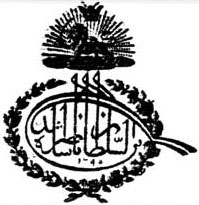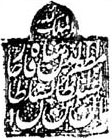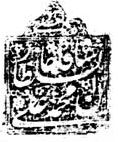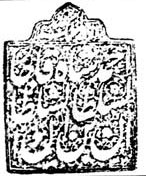Qajar dynasty
| Qajar | |
|---|---|
 Coat of arms of Qajar Iran (1907–1925) | |
 Flag of Qajar Iran (1906–1925) | |
| Parent house | Qajar tribe |
| Country | Qajar Iran |
| Founded | 1789 |
| Founder | Agha Mohammad Shah |
| Final ruler | Ahmad Shah |
| Titles | Shah of Iran |
| Deposition | 1925 |
| Cadet branches | Amirsoleimani, Bahmani |
The Qajar dynasty (Persian: دودمان قاجار, romanized: Dudemâne Ǧâjâr; 1789–1925)[a] was an Iranian[1] royal dynasty founded by Mohammad Khan (r. 1789–1797) of the Qoyunlu clan of the Turkoman[2] Qajar tribe.
The dynasty's effective rule in Iran ended in 1925 when Iran's Majlis, convening as a constituent assembly on 12 December 1925, declared Reza Shah, a former brigadier-general of the Persian Cossack Brigade, as the new shah of Pahlavi Iran.
List of Qajar monarchs
[edit]| No. | Shah | Portrait | Reigned from | Reigned until | Tughra | |||
|---|---|---|---|---|---|---|---|---|
| 1 | Mohammad Khan Qajar | 
|
1789[3] | 17 June 1797 | 
| |||
| 2 | Fat′h-Ali Shah Qajar | 
|
17 June 1797 | 23 October 1834 | 
| |||
| 3 | Mohammad Shah Qajar | 
|
23 October 1834 | 5 September 1848 | 
| |||
| 4 | Naser al-Din Shah Qajar | 
|
5 September 1848 | 1 May 1896 | 
| |||
| 5 | Mozaffar ad-Din Shah Qajar | 
|
1 May 1896 | 3 January 1907 | 
| |||
| 6 | Mohammad Ali Shah Qajar | 
|
3 January 1907 | 16 July 1909 | 
| |||
| 7 | Ahmad Shah Qajar | 
|
16 July 1909 | 31 October 1925 | 
| |||
Qajar imperial family
[edit]The Qajar Imperial Family in exile is currently headed by the eldest descendant of Mohammad Ali Shah, Sultan Mohammad Ali Mirza Qajar, while the Heir Presumptive to the Qajar throne is Mohammad Hassan Mirza II, the grandson of Mohammad Hassan Mirza, Sultan Ahmad Shah's brother and heir. Mohammad Hassan Mirza died in England in 1943, having proclaimed himself shah in exile in 1930 after the death of his brother in France.
Today, the descendants of the Qajars often identify themselves as such and hold reunions to stay socially acquainted through the Kadjar (Qajar) Family Association,[4] often coinciding with the annual conferences and meetings of the International Qajar Studies Association (IQSA). The Kadjar (Qajar) Family Association was founded for a third time in 2000. Two earlier family associations were stopped because of political pressure. The offices and archives of IQSA are housed at the International Museum for Family History in Eijsden.
Titles and styles
[edit]The shah and his consort were styled Imperial Majesty. Their children were addressed as Imperial Highness, while male-line grandchildren were entitled to the lower style of Highness; all of them bore the title of Shahzadeh or Shahzadeh Khanoum.[5]
Qajar dynasty since 1925
[edit]- Heads of the Qajar Imperial Family
The headship of the Imperial Family is inherited by the eldest male descendant of Mohammad Ali Shah.
- Sultan Ahmad Shah Qajar (1925–1930)
- Fereydoun Mirza (1930–1975)
- Sultan Hamid Mirza (1975–1988)
- Sultan Mahmoud Mirza (1988)
- Sultan Ali Mirza Qajar (1988–2011)
- Sultan Mohammad Ali Mirza (2011–present)
- Heirs Presumptive of the Qajar dynasty
The Heir Presumptive is the Qajar heir to the Persian throne.
- Sultan Ahmad Shah Qajar (1925–1930)
- Mohammad Hassan Mirza (1930–1943)
- Fereydoun Mirza (1943–1975)
- Sultan Hamid Mirza (1975–1988)
- Mohammad Hassan Mirza II (1988–)
Notable members
[edit]
- Politics
- Princess Turan Amirsoleimani, she was the third wife of Reza Shah, with whom she had one son Gholam Reza Pahlavi
- Prince Abdol-Hossein Farmanfarma, prime minister of Iran
- Mohammad Mosaddegh, prime minister of Iran and nephew of Prince Abdol Hossein Mirza Farmanfarma.
- Prince Firouz Nosrat-ed-Dowleh III, son of Prince Abdol-Hossein Farmanfarma, foreign minister of Iran
- Hossein Khan Sardar, last ruler of the Erivan Khanate administrative division
- Prince Majd ed-Dowleh Amirsoleimani, one of Iran's most influential politicians of his time. He was a key court figure throughout the reigns of several Qajar Shahs, including Nasser al-Din Shah, Mozaffar ad-Din Shah, Mohammad Ali Shah, and Ahmad Shah.
- Amir Abbas Hoveyda, Iranian economist and politician, prime minister of Iran from 1965 to 1977, a Qajar descendant on his maternal side
- Ali Amini, prime minister of Iran
- Prince Iraj Eskandari, Iranian communist politician
- Princess Maryam Farman Farmaian, Iranian communist politician, founder of the women's section of the Tudeh Party of Iran
- Ardeshir Zahedi, Iranian diplomat, Qajar descendant on his maternal side.
- Prince Sabbar Farmanfarmaian, health minister in Mosaddeq cabinet
- Abdol-Hossein Sardari, Consul General at the Iranian Embassy in Paris 1940–1945; helped and saved the lives of Jews in danger of deportation by issuing them with Iranian passports. A Qajar Qoyunlu and through his mother a grandson of Princess Malekzadeh Khanoum Ezzat od-Doleh, the sister of Nasser ed-Din Shah.
- Aga Khan III, President of the League of Nations from 1937 to 1938, one of the founders and the first president of the All-India Muslim League and the 48th Imam of the Nizari Ismaili Muslims.
- Military
-
Aleksander Petrovich Reza Qoli Mirza (1869-1941)
-
Feyzullah Mirza Qajar (1872-1920)
-
Amanullah Mirza Jahanbani (1869-1912)[6]
-
Nader Jahanbani (1928-1979)
- Prince Amanullah Mirza Qajar, Imperial Russian, Azerbaijani, and Iranian military commander
- Prince Feyzulla Mirza Qajar, Imperial Russian and Azerbaijani (ADR) military commander
- Prince Ali Qulu Mirza Qajar, Imperial Russian military commander, having the rank of Lieutenant Colonel
- Prince Aleksander Reza Qoli Mirza Qajar, Imperial Russian military leader, commander of Yekaterinburg (1918)
- Prince Amanullah Jahanbani, senior Iranian general
- Nader Jahanbani, general and vice-deputy chief of the Imperial Iranian Air Force
- Social work
- Princess Sattareh Farmanfarmaian, Iranian social work pioneer
- Business
- Princess Fakhr-ol-dowleh
Religion
- Aga Khan IV, the 49th and current Imam of Nizari Ismailism, a denomination of Isma'ilism within Shia Islam.
- Women's rights
- Princess Mohtaram Eskandari, intellectual and pioneering figures in Iranian women's movement.[7]
- Iran Teymourtash (Légion d'honneur), journalist, editor and publisher of the newspaper Rastakhiz, founder of an association for helping destitute women. Daughter of court minister Abdolhossein Teymourtash and through both her maternal grandparents a Qajar.[8]
- Literature
- Prince Iraj, Iranian poet and translator
- Sadegh Hedayat, a Qajar descendant through the female line
- Anvar Khamei, the Iranian economist, politician, and sociologist.
- Entertainment
- Sepand Amirsoleimani, Iranian actor.
- Kamand Amirsoleimani, Iranian actress.
- Gholam-Hossein Banan, Iranian musician and singer, Qajar descendant on his maternal side.[9]
Family tree
[edit]Mothers of Qajar Shahs
[edit]See also
[edit]- Abdolhossein Teymourtash
- Austro-Hungarian military mission in Persia
- Bahmani family
- History of Iran
- History of the Caucasus
- Khanates of the Caucasus
- List of kings of Persia
- List of Shi'a Muslims dynasties
- Mirza Kouchek Khan
- Qajar art
- Qajar Iran
Notes
[edit]- ^ Also romanized as Ghajar, Kadjar, Qachar etc.
Citations
[edit]- ^ Amanat 1997, p. 2: "In the 126 years between the fall of the Safavid state in 1722 and the accession of Nasir al-Din Shah, the Qajars evolved from a shepherd-warrior tribe with strongholds in northern Iran into a Persian dynasty with all the trappings of a Perso-Islamic monarchy."
- ^ Sümer 1978.
- ^ Perry, J. R. (1984). "ĀḠĀ MOḤAMMAD KHAN QĀJĀR". In Yarshater, Ehsan (ed.). Encyclopædia Iranica. Vol. I/6. pp. 602–605.
in Ramażān, 1210/ March, 1796, he was officially crowned shah of Iran.
- ^ "Qajar People". Qajars. Retrieved 31 October 2012.
- ^ "Qajar (Kadjar) Titles and Appellations". www.qajarpages.org. Retrieved 31 May 2020.
- ^ برخورد جهان اسلام با مسئله افغانستان. University of Arizona Libraries. 1989.
- ^ Paidar 1997, p. 95.
- ^ L. A. Ferydoun Barjesteh van Waalwijk van Doorn (Khosrovani) (ed.), "Qajar Studies". Journal of the International Qaja Studies Association, vol. X–XI, Rotterdam, Gronsveld, Santa Barbara and Tehran 2011, p. 220.
- ^ Caton 1988.
Sources
[edit]- Atabaki, Touraj (2006). Iran and the First World War: Battleground of the Great Powers. I.B. Tauris. ISBN 978-1860649646.
- Bournoutian, George A. (1980). The Population of Persian Armenia Prior to and Immediately Following its Annexation to the Russian Empire: 1826–1832. Nationalism and social change in Transcaucasi. The Wilson Center, Kennan Institute for Advanced Russian Studies.
- Bournoutian, George A. (2002). A Concise History of the Armenian People: (from Ancient Times to the Present) (2 ed.). Mazda Publishers. ISBN 978-1568591414.
- Caton, M. (1988). "BANĀN, ḠOLĀM-ḤOSAYN". Encyclopaedia Iranica.
- Dowling, Timothy C. (2014). Russia at War: From the Mongol Conquest to Afghanistan, Chechnya, and Beyond [2 volumes]. ABC-CLIO. ISBN 978-1598849486.
- Fisher, William Bayne; Avery, P.; Hambly, G. R. G; Melville, C. (1991). The Cambridge History of Iran. Vol. 7. Cambridge: Cambridge University Press. ISBN 978-0521200950.
- Hitchins, Keith (1998). "EREKLE II". EREKLE II – Encyclopaedia Iranica. Encyclopaedia Iranica. Vol. VIII, Fasc. 5. pp. 541–542.
- Holt, P.M.; Lambton, Ann K.S.; Lewis, Bernard (1977). The Cambridge History of Islam. Cambridge: Cambridge University Press. ISBN 978-0521291361.
- Kettenhofen, Erich; Bournoutian, George A.; Hewsen, Robert H. (1998). "EREVAN". Encyclopaedia Iranica. Vol. VIII, Fasc. 5. pp. 542–551.
- Kohn, George C. (2006). Dictionary of Wars. Infobase Publishing. ISBN 978-1438129167.
- Mikaberidze, Alexander (2011). Conflict and Conquest in the Islamic World: A Historical Encyclopedia. Vol. 1. ABC-CLIO. ISBN 978-1598843361.
- Mikaberidze, Alexander (2015). Historical Dictionary of Georgia (2nd ed.). Rowman & Littlefield. ISBN 978-1442241466.
- Gvosdev, Nikolas K.: Imperial policies and perspectives towards Georgia: 1760–1819, Macmillan, Basingstoke 2000, ISBN 0-312-22990-9
- Lang, David M.: The last years of the Georgian Monarchy: 1658–1832, Columbia University Press, New York 1957
- Paidar, Parvin (1997). Women and the Political Process in Twentieth-Century Iran. Cambridge: Cambridge University Press. ISBN 9780521595728.
- Perry, John (1991). "The Zand dynasty". The Cambridge History of Iran, Vol. 7: From Nadir Shah to the Islamic Republic. Cambridge: Cambridge University Press. pp. 63–104. ISBN 9780521200950.
- Suny, Ronald Grigor (1994). The Making of the Georgian Nation. Indiana University Press. ISBN 978-0253209153.
- Sümer, Faruk (1978). "Ḳād̲j̲ār". In van Donzel, E.; Lewis, B.; Pellat, Ch. & Bosworth, C. E. (eds.). The Encyclopaedia of Islam, Second Edition. Volume IV: Iran–Kha. Leiden: E. J. Brill. p. 387. OCLC 758278456.
- Amanat, Abbas (1997). Pivot of the Universe: Nasir Al-Din Shah Qajar and the Iranian Monarchy, 1831–1896. University of California Press. ISBN 978-0-520-08321-9.



![Amanullah Mirza Jahanbani (1869-1912)[6]](http://upload.wikimedia.org/wikipedia/commons/thumb/8/82/Amanullah_Mirza_Jahanbani.png/106px-Amanullah_Mirza_Jahanbani.png)
